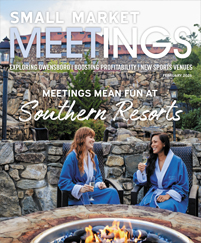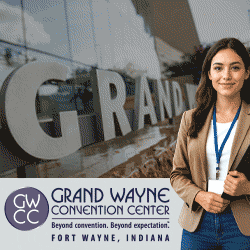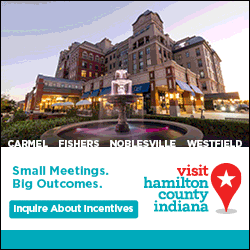In recent surveys, as many as 75 percent of meeting organizers said they had not prepared a crisis communication strategy or a contingency option for their event.
As January arrives, meeting professionals ponder what issues audiences will want to hear more about in the new year. I looked at what business experts and futurists were talking about and found that several topics were consistently discussed. They affect any type of organization, from businesses large and small to associations and nonprofit groups.
As you put together agendas for 2025 conferences and conventions, consider including some sessions or speakers that give your attendees insights and ideas about these top-of-mind subjects.
Adding AI to the toolbox
It’s no surprise that artificial intelligence sits atop the hot topic list, and rightly so. AI’s possibilities and problems make it a natural subject for books, lectures, podcasts and articles. For many, AI has become a handy assistant, capable of deftly tackling repetitive tasks. In fact, the Small Business Administration reports that just over half of small businesses use chatbots and virtual assistants for customer service. To find interesting and informed speakers on AI, check out the latest books. (Ethan Mollick’s “Co-Intelligence: Living and Working with AI” is at the top of 60,000 possibilities on Amazon.) Another strategy? Study the agendas at recent AI-focused conferences like the Artificial Intelligence Summit, hosted by the Artificial Intelligence Innovators Network (more than 1 million leaders in AI), or Convergence AI, held in Dallas last May. Meeting pros who want to improve their understanding of AI’s potential might take a four-hour online course about AI tools offered by Meeting Professionals International (MPI). For an in-depth look at AI tools for meeting planners, check out our article, Making Sense of Artificial Intelligence.
Focusing on customer service
“Customers” go far beyond shoppers in the aisles of Target or Walmart. If you run a church youth group, those kids are your customers. If you’re the executive director of an association for corn growers, farmer members are your customers. No matter what we do, we all have customers, and keeping them satisfied is paramount to our success. As with most things though, our growing use of technology has led to changes in how we connect with customers, and that’s created a crowd of experts who can talk to audiences about different aspects of customer service. Look to TED Talks to see speakers like Shep Hyken, who tells companies to look beyond their direct competitors as they set goals for customer service; Jeanne Bliss, who headed customer service for Lands’ End and Microsoft and shares a framework she’s developed to build customer growth; and trainer Myra Golden, who offers solutions to repairing broken customer relationships.
Making strides toward sustainability
Organizations of every stripe are becoming more committed to sustainability as they realize that sustainable practices save money and resources and enhance their reputation with customers and clients. So where can you find speakers to talk about these issues? The Sustainability Speakers Agency has a lineup that includes pros who have led sustainability efforts for Google, L’Oréal, IKEA and others, as well as sustainability experts from government and financial institutions, wildlife conservation and agriculture. Another possibility? Bring in leaders from cities known for their sustainability efforts like Portland and Eugene, Oregon; Berkeley, San Jose and Sacramento, California; and Silver Spring, Maryland. The International Society of Sustainability Professionals also offers speakers with lively topics like “How to Turn the Tables on Food Waste” and “Your Empty Wine Bottle Could Help Rebuild Coastlines.” For the meeting planner who wants to personally learn more about planning sustainable events, the Events Industry Council offers a Sustainable Events Professional Certificate course.
Reworking the workplace
The pandemic changed the workplace, upending the in-the-office, 9-to-5 routine and making the “open office” concept seem like a bad idea. It also proved that staff can work effectively from their homes or other remote locations, especially as Zoom and Teams proved capable of pulling everyone together in a virtual conference space. Speakers can come at this topic from many angles, including what changes are needed to make workspaces healthier and safer; how to design hybrid work models; and advantages and disadvantages of a nontraditional workplace. For thoughts about office design, consider experts on workplace design at university architecture schools like Carnegie Mellon’s Center for Building Performance and Diagnostics. Or check out an industry publication, like Buildings magazine, to find experts who’ve penned articles about workplace innovations. Medical experts can address how workspaces affect health and well-being. Another idea? Have roundtable discussions so attendees can talk about how their workplaces have changed, how it’s affected them and how their workplaces could be improved.
Becoming more resilient
People have always had worries, but in the past few years, threats seemed to have piled up: a worldwide pandemic, wars, political upheaval, natural disasters, climate change. It’s no wonder people ask, “How can I become more resilient?” Dr. Amit Sood, a resiliency expert and executive director of the Global Center on Resiliency and Well-being, has found that healthcare workers who were once cynical about the importance of resilience are now on board with the Resilient Option, a framework he developed that improves resilience and builds a positive work culture. If you, too, are interested in helping your audiences learn more, a good place to start might be the National Speakers Association’s directory of Certified Speaking Professionals. Among the CSPs available is Eileen McDargh, whose latest book is “Burnout to Breakthrough: Building Resilience to Refuel, Recharge and Reclaim What Matters.” She also wrote “Your Resiliency GPS, A Guide for Growing Through Life and Work.”












